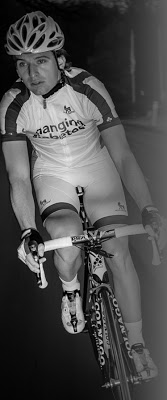Novo Nordisk has a penchant for teaming up with athletes to help promote its diabetes franchise. You might recall that in the U.S. Novo Nordisk’s Levemir insulin brand team sponsors Charlie Kimball, a racecar driver who has diabetes (see here). Just recently Novo Nordisk in Europe created the first all-diabetes professional cycling team to compete as part of “Team Novo Nordisk.”
Auto racing and cycling are two sports that are heavily sponsored by corporations. Brand and company logos are plastered all over the machines and the uniforms worn by the athletes. Kimball is a Levemir-branded billboard that must comply with FDA regulations because he displays the Levemir logo and is known to use the drug to treat his diabetes. Therefore, the back of his uniform must include fair balance (seriously!).
Pharma companies, however, cannot sponsor branded ads in Europe. Consequently, the uniforms worn by the cyclists of Team Novo Nordisk only sport the corporate logo and the tag line “Changing Diabetes” (see the photo on the left, which is the one used by the @TeamNovoNordisk Twitter home page; see more photos here).
In order for this sponsorship to work, Novo has to be EXTREMELY careful about “doping,” which as we know from Lance Armstrong et al is (or was) rampant in the professional cycling circuit. Artificial insulin (e.g., Levemir) is reportedly being used by a growing number of athletes in an effort to boost performance illegally (see here). The International Olympic Committee banned the use of this hormone by non-diabetic athletes in 1998 and Team Novo Nordisk has announced that they will set up a zero-tolerance doping policy; presumably doping with performance enhancing drugs OTHER than Levemir (see here).
It is perfectly legal for Team Novo Nordisk members — all of whom have diabetes — to use Levemir while racing. Does it give them an advantage similar to the “advantage” that some people claim runners with high-tech prosthetic limbs have (see here)?
“We don’t want riders who have ever been convicted of doping, and there will be immediate consequences, if one uses illegal means,” Jacob Riis, senior vice president at Novo Nordisk, told the Ritzau news agency. “Otherwise, we rely on the initiatives taken by the international cycling union UCI has begun.”
“The World Anti Doping Agency (WADA) is currently seeking a test for insulin abuse,” according to the article cited above. That agency may have a technique that can discriminate metabolites of lantus insulin (a long-acting synthetic insulin) from naturally produced human insulin. “However, this method doesn’t seem to work for the urine samples from diabetic patients who have been treated with recombinant human insulin or Levemir, two other commercially available long-acting insulins. This is obviously a major drawback when trying to establish a reliable test to detect insulin abuse.”
So, it may be impossible to determine if Team Novo Nordisk members are engaging in “insulin abuse” and if that would be “illegal.”
I may be cynical, but it seems that whenever there’s an incentive to commit a crime that cannot be easily detected, the odds are good that the crime will be committed. Hopefully, Novo will be able to eliminate the incentive for Team Novo Nordisk members to “abuse” Levemir and make sure the team focuses on the goal: “be an inspiration for people with diabetes.”









![6 Digital Tools at the Center of Healthcare Digitalization [INFOGRAPHIC]](http://ec2-54-175-84-28.compute-1.amazonaws.com/pharma-mkting.com/wp-content/uploads/2021/04/6DigitalTools_600px-100x70.jpg)




